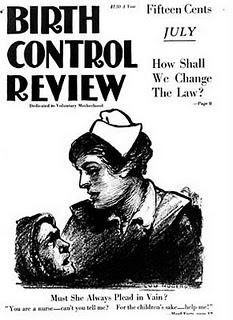 Margaret Sanger is a historical figure who is no less controversial now than she was 100 years ago when she began her work to make birth control and abortion readily available to American women. While many of her ideas on birth control are readily accepted today, the moral debate on abortion continues with Planned Parenthood, the organization that Sanger founded, firmly at its center. How did a woman, who was by all accounts a typical American housewife, find herself at the center of a cultural revolution?
Margaret Sanger is a historical figure who is no less controversial now than she was 100 years ago when she began her work to make birth control and abortion readily available to American women. While many of her ideas on birth control are readily accepted today, the moral debate on abortion continues with Planned Parenthood, the organization that Sanger founded, firmly at its center. How did a woman, who was by all accounts a typical American housewife, find herself at the center of a cultural revolution?
Sanger was raised in the late 19th century by a middle class father who encouraged her to believe that America could be a better place with a welfare state that provided resources and opportunities to all. As one of her parents’ eleven children, she was exposed first-hand to the dangers and hardships of continual childbearing. Her mother died at age 46.
Outspoken and courageous leadership defined Margaret Sanger’s work to educate American women and provide them with birth control resources that were, at that time, illegal and frowned upon by a large portion of society. Not afraid to put her own family and freedom on the line for what she believed. Sanger smuggled illegal contraceptives into the country and distributed them from prohibited clinics.
 Sanger was a leader who was willing to put everything that she had on the line for the sake of her beliefs. She believed that it was vitally important to provide birth control and abortion services to American women for the sake of their health, mental well-being, and personal and financial freedom. Her time working as a nurse in poverty-stricken areas of New York had given her firmly entrenched, progressive ideas about women’s reproductive rights.
Sanger was a leader who was willing to put everything that she had on the line for the sake of her beliefs. She believed that it was vitally important to provide birth control and abortion services to American women for the sake of their health, mental well-being, and personal and financial freedom. Her time working as a nurse in poverty-stricken areas of New York had given her firmly entrenched, progressive ideas about women’s reproductive rights.
By frequently espousing concerns for the poor women of America, Sanger was able to gain the support of many women who were enticed by the idea that they may not have to give birth to a child every year or two, oftentimes one that they could little afford to support. Against a backdrop of World War I, women were united by common objectives of gaining the right to vote and the power to control their own bodies.
Sanger was able to establish herself as a leader and encourage a group of citizenry that had formerly not had a voice with her strong ambition, compassion, and immovable beliefs. By demonstrating a willingness to do anything to see her goals become reality, Margaret Sanger proved to be one of America’s earliest and most influential female leaders.
And yet, by our current standards, Margaret Sanger can be criticised for her some of her judgements. For example, she is a frequent target of criticism by opponents of birth control and has also been criticized for supporting eugenics, but remains an iconic figure in the American reproductive rights movement.
